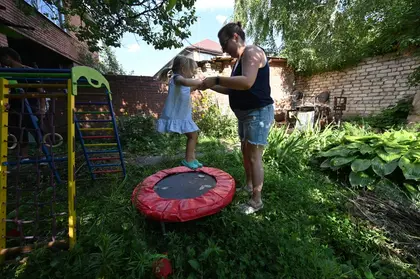Scooping up shards of metal near her toddler's trampoline, Tatiana Filipova recalled how Russian drones pummeled her neighbourhood in northeastern Ukraine after their return from a war-imposed exile in the centre of the country.
Filipova's family was among hundreds of thousands of people who fled the border region of Kharkiv as it was systematically shelled early in Russia's invasion, leaving smashed-up residential areas eerily empty.
JOIN US ON TELEGRAM
Follow our coverage of the war on the @Kyivpost_official.
Residents poured back after Moscow's forces were driven out last September, despite the threat of Russian strikes and a new push to recapture the frontline hub of Kupiansk.
"My life was paused," Filipova told AFP in her garden patio, recalling the day she fled the encroaching war in March last year.
The 35-year-old marketing executive fled to the relative safety of central Ukraine with her three-year-old daughter Valery, three cats and as many belongings that could fit in her car. Her husband, Vladyslav, refused to leave his ailing grandfather.
After months in limbo, Filipova returned when the Russians retreated, but the illusion of safety was shattered when their neighbourhood was hit in a midnight attack earlier this month.
The approaching Iranian-made drones, which sounded like a sputtering "old motorcycle", prompted the family to rush away from the windows, while Vladyslav found himself shielding his child with his body.
One drone slammed into a technical college nearby, shaking their house and leaving cracks in the walls. Another crashed nearby, leaving their fence pocked by shrapnel. Their backyard, festooned with flowers and Valery's toys, was still littered with pieces of mangled debris.

Restored in Hours: How Kyiv Utilities Bring City Life Back After Aerial Attacks
"When you live in Kharkiv you can get hit any time," Filipova said.
- Tears -
Her experience underscores how those displaced by the war and later returned to Kharkiv are being exposed once again to bombing raids that have increased since Ukraine launched its counteroffensive hundreds of miles away.
Authorities last week announced mandatory evacuations of the frontline Kupiansk district, where growing hostilities have raised the spectre of a second Russian occupation.
Victoria Revenko, 38, said her two children, 11 and 9, blamed her for the loss of their father, who volunteered to fight after returning to Kharkiv from the capital Kyiv, their refuge from the early days of war.
"My son says: 'If we had stayed in Kyiv, this would never have happened"," Revenko said.
Refusing to come to terms with their father's recent killing on the eastern Lugansk frontline, the children still send text messages to his phone hoping for a response.
Sobbing during the interview with AFP in a park, Revenko said she holds back the tears at home to avoid further upsetting her children.
- Fatalism -
About 1.2 million people now live in Kharkiv city from a low of around 300,000 after the war erupted, mayor Igor Terekhov told AFP, citing official estimates. That is close to the pre-war population of about 1.5 million.
Some residents instead measure the influx in terms of ballooning traffic jams.
Ukraine's second biggest city, located around 30 kilometres (19 miles) from the Russian border, was never occupied but it is filled with bomb-scarred monuments to a savage war -- museums scarred by shrapnel, universities without roofs and streets with gaping craters.
Returnees found a city with few job opportunities surrounded by settlements where mines and unexploded ordnance left behind by the Russians make life dangerous even without the fresh attacks.
The repopulation illustrates the "fatalistic" attitude of people who refuse to believe the war will last for long or struggle to blend into other places and yearn for home despite the dangers, Kharkiv-based political analyst Nataliya Zubar told AFP.
- 'War and death' -
A running joke is that Kharkiv natives can be easily distinguished in a crowd of Ukrainians because they are often the least responsive when air raid sirens wail.
Many see no point in hiding as being so near the border means missiles often land before the warning sounds.
Alina Ostrykova, an NGO worker who returned to Kharkiv this summer with her toddler despite having the means to leave the country, echoed the sentiment by pointing to a woman in heels outside a trendy bar.
"She knows it won't be easy to run to a shelter in heels," Ostrykova, 31, told AFP.
"What option do people have? Just keep running?"
In a way, Ostrykova added, it is the fatalism of the people who have returned or refused to leave that saved Ukraine from collapsing after the invasion.
A similar sentiment reigns in Filipova's home, recently renovated at great expense despite the risks of war.
The family plans to stay put after the recent strikes and, for now, are happy for their child to mistake the explosions for thunder.
"I don't think a three-year-old can grasp the concept of war and death," Filipova said.
"It's better she thinks it's thunder."
You can also highlight the text and press Ctrl + Enter










